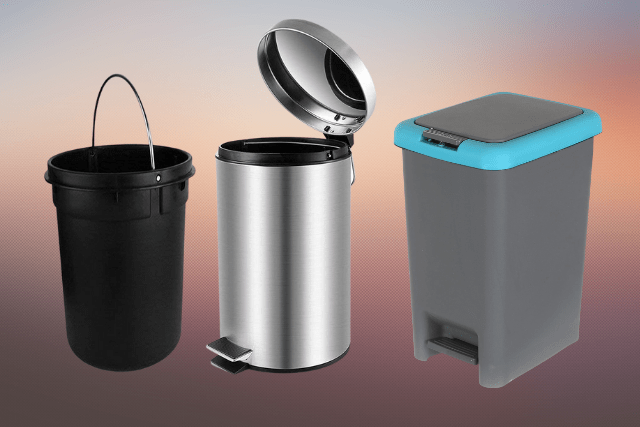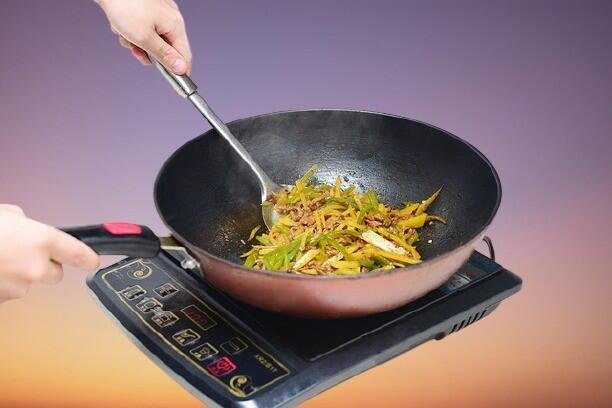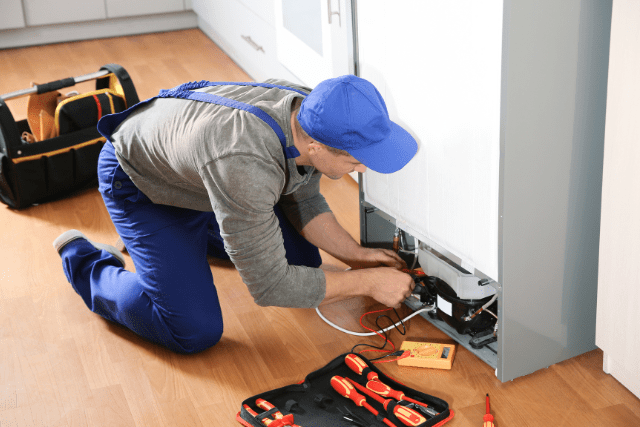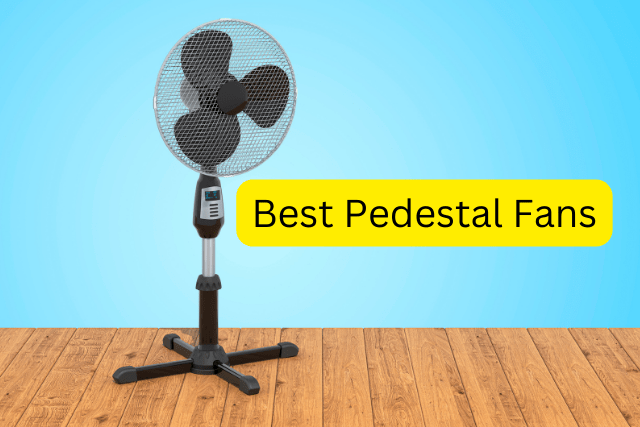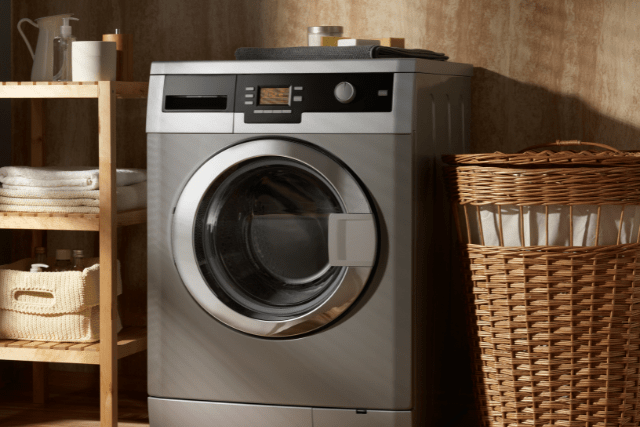The best water heater for home is more than just a device; it’s the guardian of comfort, the provider of warmth, and the unsung hero of your daily life.
This guide is here to help you navigate purchasing the best water heater for your home. We will cover the types of water heaters available, their pros and cons, and how to determine the right size and fuel source for your home. We will also discuss important considerations for installation and maintenance.
By the end of this guide, you will have all the information you need to decide and purchase the perfect water heater for your home.
Purpose of water heaters
A water heater is a device used to heat water for domestic or commercial purposes. It is an essential appliance in many homes, as it provides a reliable source of hot water for various household tasks such as washing dishes, taking showers, doing laundry, and cleaning.
Water heaters typically heat water using electricity, natural gas, propane, oil, or solar energy and store it in a tank until needed.
Types of water heaters
Several types of water heaters are available on the market, each with unique features and benefits. The six main types are:
1. Tankless water heaters
Tankless or on-demand water heaters do not have a storage tank and heat water as it flows through the unit. They use a gas burner or electric heating element to heat the water to the desired temperature and a flow sensor to detect when hot water is needed.
When a hot water tap is turned on, the flow sensor activates the burner or heating element, heating the water through the unit. The heated water is then delivered to the tap or appliance being used.
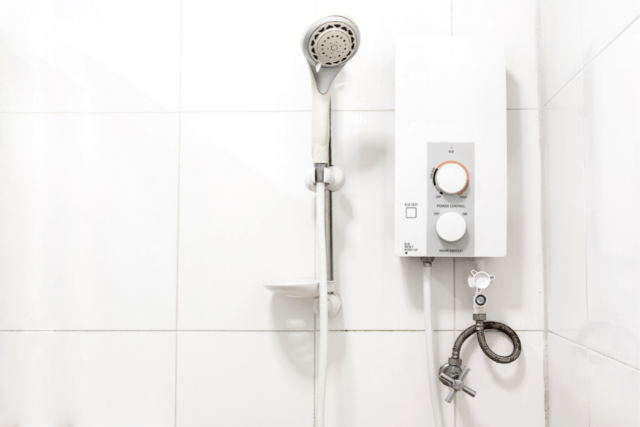
Advantages of tankless water heaters:
- Unlimited hot water: Because tankless water heaters heat water on demand, they can provide a continuous hot water supply if the unit is sized correctly for the home. This means you’ll never run out of hot water, even if you have multiple showers, laundry loads, and dishes to do simultaneously.
- Energy efficiency: Tankless water heaters are more energy efficient than tank-type water heaters because they only use energy when hot water is needed, rather than continuously heating and maintaining the temperature of a large tank of water. This can result in significant energy savings over time.
- Space saving: Tankless water heaters are much smaller than tank-type water heaters, which makes them a good option for homes with limited space. They can be mounted on a wall or cabinet, freeing up valuable floor space.
- Long lifespan: Tankless water heaters have a longer lifespan than tank-type water heaters, with some models lasting up to 20 years or more. This can save homeowners the cost and hassle of replacing a water heater every 10-15 years.
Disadvantages of tankless water heaters:
- Higher initial cost: Tankless water heaters have a higher initial cost than tank-type water heaters, which can deter some homeowners. However, tankless water heaters’ energy savings and longer lifespan may offset the higher upfront cost.
- Limited flow rate: Tankless water heaters have a limited flow rate, which means they cannot provide hot water to multiple fixtures or appliances simultaneously. This can be a problem in larger households or homes with multiple bathrooms.
- Need for professional installation: Tankless water heaters require professional installation, which can add to the unit’s overall cost.
| Advantage | Disadvantage |
| Unlimited hot water | Higher initial cost |
| Energy efficiency | Limited flow rate |
| Space saving | Need for professional installation |
| Long lifespan |
Sizing a tankless water heater for your home
To ensure that a tankless water heater can meet the hot water needs of your household, it is important to size the unit correctly.
The size of the unit will depend on the number of people in your household, the climate you live in, and the type of fuel you use.
Tankless water heater manufacturers typically provide sizing guides or calculators on their websites to help you determine the appropriate size for your home.
Maintenance and troubleshooting tips for tankless water heaters
To keep your tankless water heater running efficiently and extend its lifespan, it is important to perform regular maintenance and address any issues that may arise.
Here are some tips for maintaining and troubleshooting your tankless water heater:
- Flush the unit regularly: To remove any sediment or scale that may build up, it is recommended to flush the tankless water heater every six months to a year, depending on the water quality in your area. This can be done by attaching a hose to the drain valve and flushing the unit until the water runs clear.
- Replace the filter: Tankless water heaters may have a replaceable filter that helps to remove sediment and other contaminants from the water. Replacing the filter regularly, according to the manufacturer’s instructions, is essential to ensuring the unit runs efficiently.
- Check the gas supply: If you have a gas-powered tankless water heater, ensure the gas supply is turned on and the gas line is connected correctly. A gas leak can be dangerous, so it is essential to check for leaks regularly and have any issues addressed by a professional.
- Check the venting system: The venting system of a tankless water heater is essential for removing exhaust gases from the unit. Ensure that the venting system is clear of any obstructions and that the vent cap is in good condition.
- Check the temperature and pressure relief valve: The temperature and pressure relief valve is a safety feature that opens to release excess pressure or temperature from the tankless water heater. It is important to test the valve regularly to ensure it works properly.
- Check the ignition system: If you have a gas-powered tankless water heater, the ignition system lights the burner. The unit may not heat the water if the ignition system is malfunctioning.
- Check the heating element. If you have an electric tankless water heater, the heating element is responsible for heating the water. The unit may not heat the water if the heating element is malfunctioning.
Also, read:
- Best Geyser Water Heater in India (3 Litre, Electric)
- Which One is the Best Water Heater for the Bathroom?
2. Tank-type water heaters
How tank-type water heaters work Tank-type water heaters, also known as storage water heaters, have a large tank that stores hot water until needed. They use energy to heat and maintain the temperature of the water in the tank, which means they are less energy efficient than tankless water heaters. Tank-type water heaters are available in electric, gas, and oil-powered models.
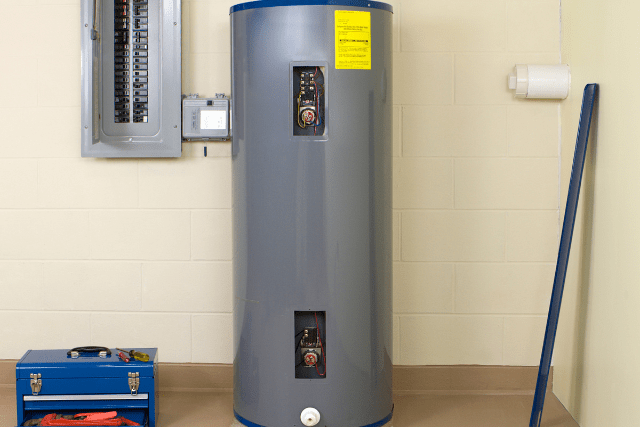
- Electric tank-type water heaters use an electric heating element to heat the water in the tank.
- Gas tank-type water heaters use a gas burner to heat the water in the tank.
- Oil tank-type water heaters use an oil-fired burner to heat the water in the tank.
Advantages of tank-type water heaters
- Lower initial cost: Tank-type water heaters have a lower initial cost than tankless water heaters, which makes them a more budget-friendly option for some homeowners.
- Shorter recovery time: Tank-type water heaters have a larger tank of hot water, meaning they have a shorter recovery time than tankless water heaters. This means you won’t have to wait as long for hot water when multiple fixtures or appliances are in use.
Disadvantages of tank-type water heaters
- Less energy efficient: Tank-type water heaters are less energy efficient than tankless water heaters because they use energy to heat and maintain the temperature of a large tank of water, rather than only heating water on demand. This can result in higher energy bills over time.
- Limited hot water capacity: Tank-type water heaters have a limited hot water capacity, which means they may run out of hot water if multiple fixtures or appliances are used simultaneously.
- Limited lifespan: Tank-type water heaters have a shorter lifespan than tankless water heaters, with most models lasting 10–15 years before they need to be replaced.
| Advantage | Disadvantage |
| Lower initial cost | Less energy efficient |
| Shorter recovery time | Limited hot water capacity |
| Limited lifespan |
Sizing a tank-type water heater for your home
To ensure that a tank-type water heater can meet the hot water needs of your household, it is important to size the unit correctly.
The size of the unit will depend on the number of people in your household, the climate you live in, and the type of fuel you use.
Tank-type water heater manufacturers typically provide sizing guides or calculators on their websites to help you determine the appropriate size for your home.
Maintenance and troubleshooting tips for tank-type water heaters
To keep your tank-type water heater running efficiently and extend its lifespan, it is important to perform regular maintenance and address any issues that may arise.
Here are some tips for maintaining and troubleshooting your tank-type water heater:
- Drain the tank regularly: To remove any sediment or scale that may build up, it is recommended to drain the tank-type water heater every six months to a year, depending on the water quality in your area. This can be done by attaching a hose to the drain valve and draining the water from the tank until it runs clear.
- Check the temperature and pressure relief valve: The temperature and pressure relief valve is a safety feature that opens to release excess pressure or temperature from the tank-type water heater. It is important to test the valve regularly to ensure it works properly.
- Check the heating element. If you have an electric tank-type water heater, the heating element is responsible for heating the water in the tank. The unit may not heat the water if the heating element is malfunctioning.
- Check the gas supply: If you have a gas-powered tank-type water heater, ensure the gas supply is turned on and the gas line is properly connected. A gas leak can be dangerous, so it is important to check for leaks regularly and have any issues addressed by a professional.
- Check the venting system: The venting system of a tank-type water heater is important for removing exhaust gases from the unit. Ensure that the venting system is clear of any obstructions and that the vent cap is in good condition.
- Check the thermostat: The thermostat is responsible for maintaining the water temperature in the tank. If the thermostat is not working properly, the unit may not heat the water to the desired temperature.
If you encounter any issues with your tank-type water heater, it is recommended to call a professional plumber or the manufacturer for assistance.
3. Solar water heaters
Solar water heaters use energy from the sun to heat water rather than relying on fossil fuels or electricity. There are two main types of solar water heaters: active and passive.
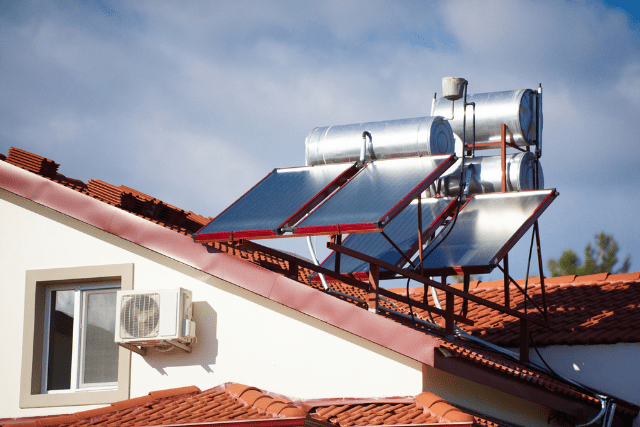
Active solar water heaters use pumps or fans to circulate water or heat transfer fluid through solar collectors mounted on the roof or a nearby structure.
The collectors absorb the sun’s energy, which is then transferred to the water or heat transfer fluid.
The heated water or fluid is then returned to the solar water heater, which is stored in a tank. When hot water is needed, it is drawn from the tank and delivered to the tap or appliance used.
Passive solar water heaters do not use pumps or fans to circulate the water or heat transfer fluid. Instead, they rely on natural convection to circulate the water or fluid through the solar collectors.
Passive solar water heaters are simpler and less expensive than active ones but may not be as efficient in colder climates.
Advantages of solar water heaters
- Free energy from the sun: Solar water heaters use energy from the sun, a free and renewable resource. This means you won’t have to pay for fuel or electricity to heat your water, which can result in significant energy savings over time.
- Long lifespan: Solar water heaters have a long lifespan, with some models lasting up to 20 years or more. This can save homeowners the cost and hassle of replacing a water heater every 10-15 years.
- Environmentally friendly: Solar water heaters do not emit greenhouse gases or other pollutants, making them a more environmentally friendly option than fossil fuel-powered water heaters.
Disadvantages of solar water heaters
- High initial cost: Solar water heaters have a high initial cost, which can deter some homeowners. However, solar water heaters’ energy savings and long lifespan may offset the higher upfront cost.
- Weather dependent: Solar water heaters depend on the sun, which means they may not be as effective in cloudy or overcast conditions. In these cases, a backup heating source may be needed to ensure that hot water is available.
- Complex installation: Solar water heaters require a complex installation process, which may involve installing solar collectors on the roof or a nearby structure and connecting the unit to the home’s plumbing and electrical systems. This can add to the overall cost of the unit.
| Advantage | Disadvantage |
| Free energy from the sun | High initial cost |
| Long lifespan | Complex installation |
| Environmentally friendly | Weather dependent |
| Energy savings | May require a backup heating source |
Sizing a solar water heater for your home
To ensure that a solar water heater can meet the hot water needs of your household, it is important to size the unit correctly.
The size of the unit will depend on the number of people in your household, the climate you live in, and the type of solar water heater you choose.
Solar water heater manufacturers typically provide sizing guides or calculators on their websites to help you determine the appropriate size for your home.
Maintenance and troubleshooting tips for solar water heaters
To keep your solar water heater running efficiently and extend its lifespan, it is important to perform regular maintenance and address any issues that may arise. Here are some tips for maintaining and troubleshooting your solar water heater:
- Clean the solar collectors: Solar collectors should be cleaned regularly to remove any dirt, dust, or debris that may accumulate on the surface. This will help ensure the collectors can absorb as much energy from the sun as possible.
- Check the water level in the tank: It is important to maintain the proper water level in the tank of a solar water heater. The unit may not function properly if the water level is too low. If the water level is too high, it may cause the unit to malfunction or even rupture.
- Check the temperature and pressure relief valve: The temperature and pressure relief valve is a safety feature that opens to release excess pressure or temperature from the solar water heater. It is important to test the valve regularly to ensure it works properly.
- Check the plumbing connections. Ensure the connections on the solar water heater are secure and not leaking.
- Check the electrical connections: Ensure that the electrical connections on the solar water heater are secure and not corroded.
- Check the insulation: The insulation on the tank of a solar water heater is important for maintaining the temperature of the water. If the insulation is damaged or worn, it should be repaired or replaced to ensure the unit runs efficiently.
If you encounter any issues with your solar water heater, it is recommended to call a professional plumber or the manufacturer for assistance.
Please do not attempt to repair the unit yourself unless you are qualified to do so, as it can be dangerous.
4. Heat pump water heaters
Heat pump water heaters use electricity to move heat from the air or ground to a storage tank rather than generating heat directly.
They are similar to air-source or ground-source heat pumps used for home heating and cooling, but they are designed specifically for water heating.
These water heaters have a storage tank and a heat pump unit. The heat pump unit is responsible for extracting heat from the air or ground and transferring it to the water in the tank. The unit has a compressor and an evaporator coil, which work together to transfer the heat.
Heat pump water heaters are available in two main types: air-source and ground-source. Air-source heat pump water heaters extract heat from the air, while ground-source heat pump water heaters extract heat from the ground using a ground loop system.
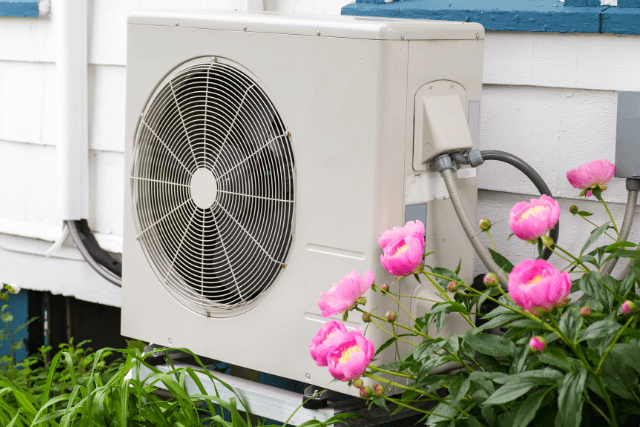
Advantages of heat pump water heaters
- High energy efficiency: Heat pump water heaters are highly energy efficient because they use electricity to move heat rather than generating it directly. This can result in significant energy savings compared to traditional water heaters.
- Low operating cost: Because heat pump water heaters are so energy efficient, they have a lower operating cost than traditional water heaters.
- Environmentally friendly: Heat pump water heaters do not emit greenhouse gases or other pollutants, making them a more environmentally friendly option than fossil fuel-powered water heaters.
- Long lifespan: Heat pump water heaters have a long lifespan, with some models lasting up to 20 years or more. This can save homeowners the cost and hassle of replacing a water heater every 10–15 years.
Disadvantages of heat pump water heaters
- High initial cost: Heat pump water heaters have a higher initial cost than traditional water heaters, which may deter some homeowners. However, the energy savings and lower operating costs of heat pump water heaters may offset the higher upfront cost over time.
- Noisy operation: Heat pump water heaters may be louder than traditional water heaters due to the compressor and evaporator coil. This can be a concern for homeowners who are sensitive to noise.
- May require a backup heating source: Heat pump water heaters may be unable to produce hot water on demand, especially in colder climates. In these cases, a backup heating source may be needed to ensure that hot water is available.
- May not be suitable for all climates: Heat pump water heaters may not be as effective in colder climates, as the air or ground may not have enough heat to transfer to the water. A different type of water heater may be more suitable in these cases.
| Advantage | Disadvantage |
| High energy efficiency | High initial cost |
| Low operating cost | Noisy operation |
| Environmentally friendly | May require a backup heating source |
| Long lifespan | It may require a backup heating source |
Sizing a heat pump water heater for your home
To ensure that a heat pump water heater can meet the hot water needs of your household, it is important to size the unit correctly.
The size of the unit will depend on the number of people in your household, the climate you live in, and the type of heat pump water heater you choose.
Heat pump water heater manufacturers typically provide sizing guides or calculators on their websites to help you determine the appropriate size for your home.
Maintenance and troubleshooting tips for heat pump water heaters
To keep your heat pump water heater running efficiently and extend its lifespan, it is important to perform regular maintenance and address any issues that may arise. Here are some tips for maintaining and troubleshooting your heat pump water heater:
- Clean the air filter: If you have an air-source heat pump water heater, it is important to clean the air filter regularly to remove any dirt, dust, or debris that may accumulate on it. A dirty air filter can reduce the unit’s efficiency and may cause it to malfunction.
- Check the refrigerant level. The refrigerant in a heat pump water heater transfers heat from the air or ground to the water in the tank. Maintaining the proper refrigerant level is important to ensure the unit is running efficiently. If you notice that the refrigerant level is low, it may indicate a leak, which a professional should address.
- Check the insulation: The insulation on the tank of a heat pump water heater is important for maintaining the temperature of the water. If the insulation is damaged or worn, it should be repaired or replaced to ensure the unit runs efficiently.
- Check the plumbing connections. Ensure the connections on the heat pump water heater are secure and not leaking. If you notice any leaks, they should be addressed by a professional plumber.
- Check the electrical connections: Ensure that the electrical connections on the heat pump water heater are secure and not corroded. If you notice any issues, they should be addressed by a professional electrician.
5. Tankless Coil and Indirect Water Heaters
A tankless coil and indirect water heater work by heating water using the heat from a boiler. The water is heated as it passes through a coil of piping inside the boiler and then circulates through the home’s hot water pipes. When hot water is needed, it is drawn from the pipes and sent to the appliance or faucet.
Advantages of Tankless Coil and Indirect Water Heaters:
- Energy efficient: These types of water heaters use the heat from a boiler to heat the water, which can be more efficient than using electricity or gas. This can result in lower energy bills and a smaller carbon footprint.
- Unlimited hot water: Tankless water heaters provide an unlimited hot water supply, as they heat the water on demand rather than storing it in a tank. This means you will never run out of hot water, even during periods of high demand.
- Compact size: Tankless water heaters take up less space than traditional tank water heaters, making them a good option for small homes or apartments.
Disadvantages of Tankless Coil and Indirect Water Heaters:
- Initial cost: These water heaters can be more expensive upfront than traditional tank water heaters, as they require both a boiler and a water heater.
- Requires a boiler: These water heaters require a boiler to function, which can be an additional cost. If you do not already have a boiler, you must factor in the cost of installing one.
- Limited hot water flow rate: Tankless water heaters may have a lower hot water flow rate than traditional tank water heaters, which can be an issue if multiple hot water appliances run simultaneously.
| Advantage | Disadvantage |
| Energy efficient | Initial cost |
| Unlimited hot water | Requires a boiler |
| Compact size | Limited hot water flow rate |
Installation and Maintenance Tips for Tankless Coil and Indirect Water Heaters:
- To install a tankless coil and indirect water heater, it is recommended to hire a professional plumber to ensure proper installation and connection to the boiler. This can ensure that the system is installed safely and correctly and can help prevent any potential issues in the future.
- Regular boiler and water heater maintenance ensures efficient operation and extends the system’s life. This can include cleaning the boiler and water heater, checking for leaks or damage, and ensuring all parts function correctly.
- It is recommended to have the water heater and boiler inspected annually to identify any potential issues. This can help catch any problems early on and prevent them from becoming more serious.
- It is important to ensure that the water heater and boiler are properly sized for your home’s hot water needs to avoid issues with insufficient hot water. A professional plumber can help you determine the correct size for your home based on your hot water usage habits.
6. Tankless Instantaneous Water Heaters
A tankless instantaneous water heater heats water on demand as it flows through the unit. When hot water is needed, a flow sensor activates the heating element to heat it as it passes through the unit.
Advantages of Tankless Instantaneous Water Heaters:
- Energy efficient: Tankless instantaneous water heaters only heat water as needed, which can be more energy efficient than traditional tank water heaters.
- Unlimited hot water: These water heaters provide an unlimited hot water supply, as they heat the water on demand rather than storing it in a tank.
- Compact size: Tankless water heaters take up less space than traditional tank water heaters, making them a good option for tiny homes or apartments.
Disadvantages of Tankless Instantaneous Water Heaters:
- Initial cost: Tankless instantaneous water heaters can be more expensive upfront than traditional tank water heaters.
- Limited hot water flow rate: These water heaters may have a lower hot water flow rate than traditional tank water heaters, which can be an issue if multiple hot water appliances run simultaneously.
- Requires electricity: These water heaters require electricity to function, which can be an additional cost if you do not have access to a power source.
| Advantage | Disadvantage |
| Energy efficient | Initial cost |
| Unlimited hot water | Limited hot water flow rate |
| Compact size | Requires electricity |
Installation and Maintenance Tips for Tankless Instantaneous Water Heaters:
- To install a tankless instantaneous water heater, it is recommended to hire a professional plumber to ensure proper installation and connection to the power source.
- Regular water heater maintenance ensures efficient operation and extends the unit’s life. This includes cleaning the unit, checking for leaks or damage, and ensuring all parts function correctly.
- It is recommended to have the water heater inspected annually to identify any potential issues. This can help catch any problems early on and prevent them from becoming more serious.
- It is important to ensure that the water heater is properly sized for your home’s hot water needs to avoid issues with insufficient hot water. A professional plumber can help you determine the correct size for your home based on your hot water usage habits.
Factors to consider when choosing the best water heater for home
When choosing a water heater, several factors must be considered to ensure you select the best option for your home.
Size
It’s important to choose a water heater that is the right size for your household. A water heater that is too small won’t be able to meet the hot water needs of your household, while one that is too large will be more expensive to operate and may not be energy efficient.
To determine the size you need, consider the number of people in your household and the hot water demands of your home.
For example, a family of four with a large home will likely need a larger water heater than a single person living in a small apartment.
Energy Efficiency
Water heaters can be a significant source of energy consumption in a home, so choosing one that is energy efficient is important.
Look for water heaters with a high energy factor (EF) rating, which indicates how efficient the appliance is at turning energy into hot water. Higher EF ratings mean the water heater is more efficient and will cost less.
Some water heaters, such as solar and heat pump models, are naturally more energy efficient than others.
Fuel Type
Water heaters can be powered by electricity, natural gas, propane, or oil. The fuel you choose will depend on what is available in your area and the cost of each fuel type.
For example, if natural gas is unavailable in your area, you must choose an electric or propane water heater.
The cost of each fuel type will also vary, so it’s important to compare the costs to determine which option is most cost-effective for you.
Installation and Maintenance
Depending on the type of water heater you choose, installation can vary.
Tank water heaters are typically easier to install as they do not require any special ventilation or gas lines.
Tankless water heaters, however, may require more complex installation, as they require a dedicated gas line and proper ventilation. Solar water heaters also require special installation, as they need to be properly positioned to maximize the use of solar energy.
It is important to have a professional install your water heater to ensure it is done safely and correctly.
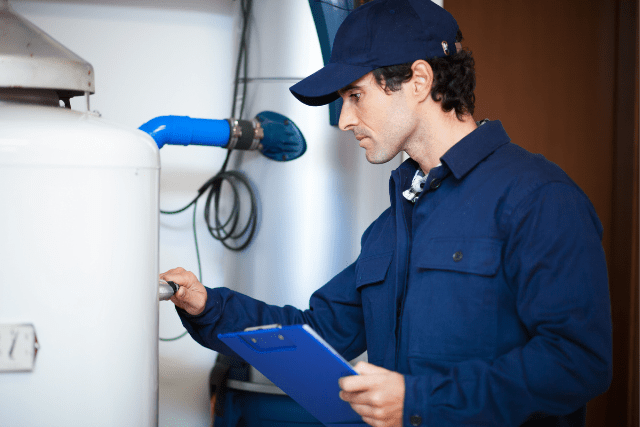
Proper maintenance is crucial to ensure the longevity and efficiency of your water heater. Tank water heaters should be drained and flushed annually to remove sediment buildup.
Tankless water heaters should be descaled every few years to remove mineral deposits.
Solar water heaters may require cleaning and maintenance of the solar panels. Following the manufacturer’s maintenance instructions for your specific water heater is important.
Cost
The cost of a water heater will depend on its size, fuel type, and energy efficiency. It’s important to consider the upfront cost and the long-term operating costs when making your decision.
Tankless water heaters, for example, may have a higher upfront cost but lower operating costs in the long run due to their energy efficiency.
On the other hand, traditional tank water heaters may have a lower upfront cost but higher operating costs due to their lower energy efficiency.
Warranty and customer service
It’s also important to consider the warranty and customer service the manufacturer provides.
Choose a water heater with a good warranty, as water heaters can be prone to issues and repairs.
Look for a unit with a long warranty, as it will provide peace of mind and potentially save money in the long run.
How to calculate your hot water usage
To calculate your hot water usage, you will need to consider a few factors:
- Number of people in the household: The more people in your household, the more hot water you will likely use.
- Types of hot water appliances: Consider the appliances in your home that use hot water, such as washing machines, dishwashers, and showers.
- Water usage habits: Think about your daily hot water habits, such as how long you typically shower, how often you run the dishwasher, and how often you do laundry.
To get a rough estimate of your hot water usage, you can use the following formula:
Gallons of hot water used per day =
(Number of people in household x Gallons of hot water per person per day)
+
(Gallons of hot water used by appliances per day)For example, if you have a family of four and use approximately 50 gallons of hot water per person daily, your daily hot water usage would be 200 gallons (4 x 50). If you also use an additional 25 gallons of hot water daily for appliances, your total daily hot water usage would be 225 gallons (200 + 25).
Remember that this is just a rough estimate, and your actual hot water usage may vary based on your specific habits and appliances.
The importance of regular water heater maintenance and inspection
Regular water heater maintenance and inspection is important for several reasons:
- Improved efficiency: Regular maintenance can help your water heater run more efficiently, saving you money on energy bills and extending the life of your water heater.
- Safety: Water heaters can be a potential safety hazard if not properly maintained. Regular inspections can identify potential issues, such as faulty gas connections or corroded tanks, which can be fixed before they become major issues.
- Longevity: Proper maintenance can help extend the life of your water heater, saving you the cost and hassle of having to replace it prematurely.
- Avoid unexpected repairs: Regular maintenance can help identify small issues before they become bigger, more expensive problems.
Overall, investing in regular water heater maintenance and inspection can save you money, improve the efficiency and safety of your water heater, and extend its lifespan.
Conclusion
Several water heaters are available in homes, including tankless, tank-type, solar, and heat pump water heaters. Each type has unique features, benefits, and potential disadvantages.
When choosing a water heater for your home, it is important to consider the following factors:
| Factor | Description |
| Capacity | Ensure that the water heater has sufficient capacity to meet the hot water needs of your household. |
| Fuel type | Consider the type of fuel available and most convenient for you, such as natural gas, propane, electricity, or solar energy. |
| Efficiency | Look for a water heater that is energy efficient to save on energy costs and reduce your carbon footprint. |
| Location | Consider the location of the water heater in your home and whether it is easily accessible for maintenance and repairs. |
| Budget | Determine your budget and choose a water heater that fits your financial needs. |
By considering these factors, you can ensure that you select the best water heater for your home. Remember to consider the pros and cons of different water heaters and the importance of proper installation, maintenance, and repairs.



